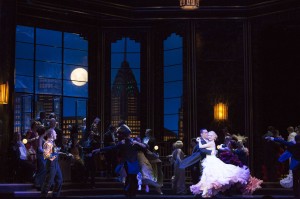Johann Strauss II’s Die Fledermaus should come with a disclaimer: “The operetta you are about to see is where substance meets the void.” Houston Grand Opera’s production, though, does a fine job with an operetta that is itself vacuous. With marvelous sets and robust singing, HGO’s performance made me wonder if I should reconsider this waltzing, drunken affair.
Die Fledermaus follows Verdi’s Aida, which opened HGO’s season last week. Thomas Rösner conducts this production from Opera Australia with attention to the elusive intricacies of the waltz perhaps only an artist straight from Vienna could muster. Set Designer Richard Roberts brings a genuine amount class to this production. Channeling a lavish 1930s Art Deco vibe, the white leather sofas, chrome trimming, zebra-print pillows, tall staircases, and high windows all made for a visual feast. It was appropriately scaled and balanced easily with the other aspects of the production.
Strictly in terms of genre, Strauss’ light operetta drastically differs from Verdi’s grand opera, but both productions prove HGO’s singers are something to hear this season. Soprano Laura Claycomb hammed up the role of wannabe actress Adele with a garish American accent, but her singing betrayed Claycomb as a serious artist. The fullness of her high notes and the accuracy with which her voice danced through Strauss’ ditties delighted and impressed. Making her HGO debut as the dallying Rosalinde, Wendy Bryn Harmer charmed with a smokier soprano timbre, which she played to stupendously in Act II. Apart from yet another gratingly put-on Hungarian accent, her rendition of csárdás was genuinely beautiful.
Baritone Liam Bonner, singing the part of the rascal Gabriel Eisenstein, has a divine instrument—I wish I could hear him sing the role of Billy Budd (which he will with the Los Angeles Opera later this season) instead. Die Fledermaus packs punch after punch of arias that showcase the voice, adding to this operetta’s reputation for light consumption; but how much better it would have been to hear any of these talented artists really dig into a meaty opera by Benjamin Britten.
Strauss wrote Die Fledermaus in a six-week blitz. Critics who are quick to criticize Die Fledermaus as trivial often dangle the fact that the original production in April 1874 was cancelled after only sixteen performances. But this was not because Strauss was too hasty or careless in his composition; in fact, it was only pulled off stage because of a pre-booked visiting opera, and Fledermaus made an extremely popular return to the Theater an der Wien in Vienna. And, as a quick browse through operabase.com shows, it persists today as a fashionable choice and an audience favorite. Since 2012, it has seen 535 performances of 121 productions in eighty-six cities. Britten’s Billy Budd has only found its way to thirty-four performances of five productions in five cities in the same time bracket search.
These shocking (and, in my opinion, sad) statistics ask a larger question: why do audiences love Fledermaus so much? It’s not because of any semblance of poetic language. Though its libretto has seen many translations, HGO’s production uses the English text. Lines like “a night of allusion / happy in our delusion” and “Kling kling kling sing sing sing” got old fast, though admittedly its German standard isn’t much better: “Ja, sie hat Recht, gehn Sie hinaus / Sonst wird noch ein Skandal daraus!” The score—an endless triple meter—is an unwelcome waltzing mass still whirling through my head. No tonal risks, no harmonic surprises. Really, nothing to spike my blood pressure.
As the program notes emphasize, Die Fledermaus hit Vienna right after a devastating depression and seemed to lift society’s spirits, or at least distract them for a moment in the theatre. Prince Orlovsky urges his guests to embrace delusion and drink up, sinking into memories of being young and frivolous. Everyone ends with a glass of champagne in their hands to perpetuate the farce. Sure, reality bites. Is that anything new? There’s validity in distraction, but if distraction is the point, shouldn’t more artistic tact be employed to sustain the illusion?
Repeatedly, Die Fledermaus shows self-awareness of being a lowbrow spectacle. Rosalinde’s warning “Don’t remove the mask I wear or you will see a sight you cannot bear,” echoed on a wider plane. When the lights came up on the “pretentious” opera audience in Act III, it felt like getting caught red-handed watching Keeping up with the Kardashians.
HGO presents a technically proficient rendition of an operetta that is what it is. HGO promises Stephen Sondheim’s intrepid musical A Little Night Music later this season as a complementing alternative to “high” opera. Sondheim’s work might prove a more worthy context for HGO’s admirable execution.
Die Fledermaus runs Oct 25 – Nov 10. For tickets and more info, check out Houston Grand Opera’s website.

